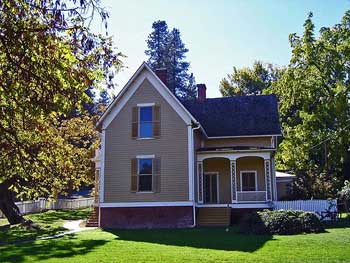Take a Great Tour of this wonderful home which serve![]() s as Jacksonville’s “museum” at the moment. The home is not usually open to the public, so Saturday, November 12 from Noon to 4pm is your opportunity to take a look, learn about the Beekman family and some interesting Jacksonville history!
s as Jacksonville’s “museum” at the moment. The home is not usually open to the public, so Saturday, November 12 from Noon to 4pm is your opportunity to take a look, learn about the Beekman family and some interesting Jacksonville history!
The tour is FREE – and donations are always appreciated to help the ongoing maintenance of this fabulous home.
A little Information about the property:
With the Beekman house, the Reames house, the Muller home across the street, and other houses no longer in existence, the Beekman House stands on Jacksonville’s pioneer equivalent of “Millionaires Row”— homes to self-made men who built their fortunes in Jacksonville.
Beekman was the most prominent one of these men and probably the wealthiest man in Jacksonville. From an initial job as a Cram & Rogers express rider between Jacksonville and San Francisco, Beekman created a business empire of banking, insurance, mining, and real estate interests.
What is now known as the Beekman House, built between 1870 and 1876, doesn’t truly reflect Beekman’s status. At the time, modesty was the order of the day; ostentation was frowned upon—this was before the “if you’ve got it, flaunt it” attitude of the 1890s.
The Beekman property originally consisted of 13 acres—3 inside the fence and 10 beyond. A 2-story barn once stood much further back on the left of the property and a woodshed-like building with lean-to awnings was where the restrooms currently are. Today, beyond the fence, you’ll find the Beekman Arboretum, home to a unique collection of plants native to Jackson County; and the Beekman Woods, both part of the Jacksonville Woodlands 18+ miles of hiking trails around Jacksonville.
This house is a very unique historical treasure because the Beekmans lived here from the 1870s to 1959 and were the only family who owned this house. The objects inside were all Beekman possessions accumulated over their years here. Most of what you will see is from the Victorian era around 1911.
When the Beekman family moved into this home, Cornelius Beekman was already well established in his downtown bank where he bought, sold, and shipped gold, served as a Wells Fargo express agent, sold school supplies and dealt in real estate. Following the discovery of gold in California, Beekman had come west to seek his fortune.
Gold played a major theme in Beekman’s business dealings. He ran a hydraulic mining operation using high water pressure to separate gold from the earth, then had mine shafts dug to remove gold-bearing ore. In the early 1870s he owned what came to be known as the Opp mine just 7 miles outside of Jacksonville, until 1907 when he sold his interests to William Opp.
Earlier on Beekman had developed a business as a packer of goods to sell to the miners and farmers arriving in Jacksonville area. He sold items from insurance and real estate to school books and pencils. Then he became a Pony Express rider, traveling over the Siskiyou Mountains. He met his future bride, Julia Hoffman, during his frequent stops to water his horse at her parents’ farm in our neighboring town of Phoenix. Mr. Hoffman must have see Cornelius Beekman as a very industrious man and encouraged Julia to accept Cornelius’ interest in her
In 1861, at age 21, Julia married 33 year old Cornelius. Culture, grace and deep religious conviction were all part of Julia’s upbringing, and Julia was very active in Jacksonville’s historic Presbyterian Church. You may be familiar with the pink Victorian Gothic building at the corner of California and 6th streets. Beekman was very instrumental in having the church built, contributing $3,000 of the $6,000 costs. He also made a special trip to San Francisco to purchase its 1,000 pound bell and carry it back over the Siskiyou Mountains on horseback.
Just beyond the church is a small white salt box-style house with yellow trim where Cornelius and Julia Beekman and their three children, Ben, Caroline (Carrie), and Lydia, lived prior to moving here. Their youngest daughter, Lydia, died at age 5 of measles when they were still living there.
The two older children never married. When Carrie passed away in 1959 the Beekman home and contents were left to the University of Oregon. Most of the contents of the home were removed to be sold at auction. The Siskiyou Pioneer’s Sites Foundation was able to get a court injunction to put the artifacts back inside. The Foundation worked with the State, County, City, and Southern Oregon Historical Society to purchase and preserve the home and its contents, and the land.
Additional information about the Jacksonville Heritage Society can be learned at www.jvilleheritage.org or 541-899-9500.

